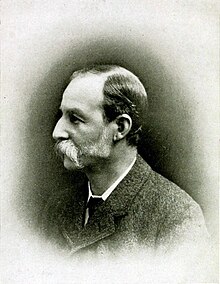Thomas Hanbury
| Thomas Hanbury | |
|---|---|

Portrait of Thomas Hanbury from the 1912 edition of Hortus Mortolensis
|
|
| Born |
21 June 1832 London |
| Died | 9 March 1907 (aged 74) La Mortola, Italy Riviera |
| Resting place | La Mortola |
| Nationality | British |
| Occupation | Entrepreneur, philanthropist |
| Known for | Giardini Botanici Hanbury, Ventimiglia |
Sir Thomas Hanbury (21 June 1832 – 9 March 1907) was an English businessman, gardener and philanthropist. He built the Giardini Botanici Hanbury, or Hanbury botanical gardens, at Mortola, between Ventimiglia and Menton, on the coast of Italy near to the border with France.
Thomas Hanbury was born on 21 June 1832 at Bedford Road, Clapham, Surrey. He was the fourth child and third son of a pharmaceutical chemist, Daniel Bell Hanbury (1794–1882), and his wife Rachel, née Christy, (c. 1802–1876). His eldest brother was the botanist and pharmacognosist Daniel Hanbury (1825–1875). The Hanburys were Quakers, and members of the family had been members of the Society of Friends since its beginnings in the seventeenth century. His great-aunt was the philanthropist and centenarian Elizabeth Hanbury. Thomas Hanbury was sent to predominantly Quaker schools, first in Croydon, and then in Epping. He remained a Friend all his life.
From 1849 Hanbury worked for the tea brokers William James Thompson & Sons in Mincing Lane, London. In 1853 he travelled to Shanghai, which had opened to foreign commerce in 1843. With three partners and with the financial backing of his uncle, he started Hanbury & Co., merchants in silk and tea. The partnership dissolved in 1857, and Hanbury and Frederick Bower entered into a new one, Bower, Hanbury & Co., which diversified into currency trading and cotton broking. Hanbury became extremely wealthy, and was the largest holder of property in Shanghai.
Hanbury arrived in China at a time of widespread civil unrest. In 1854 there were five separate rebellions within the country: the Nien Rebellion, the Red Turban Rebellion (1854–1856), the Miao Rebellion, the Small Knife Society and the vast Taiping Rebellion (1850–64), which has been described as the "most gigantic man-made disaster" of the nineteenth century. The Taiping rebels had taken Shanghai in 1851, but lost it to Qing dynasty forces in January 1853. The Small Knife Society occupied old Shanghai and many surrounding villages from 1854 to February 1855.
...
Wikipedia
